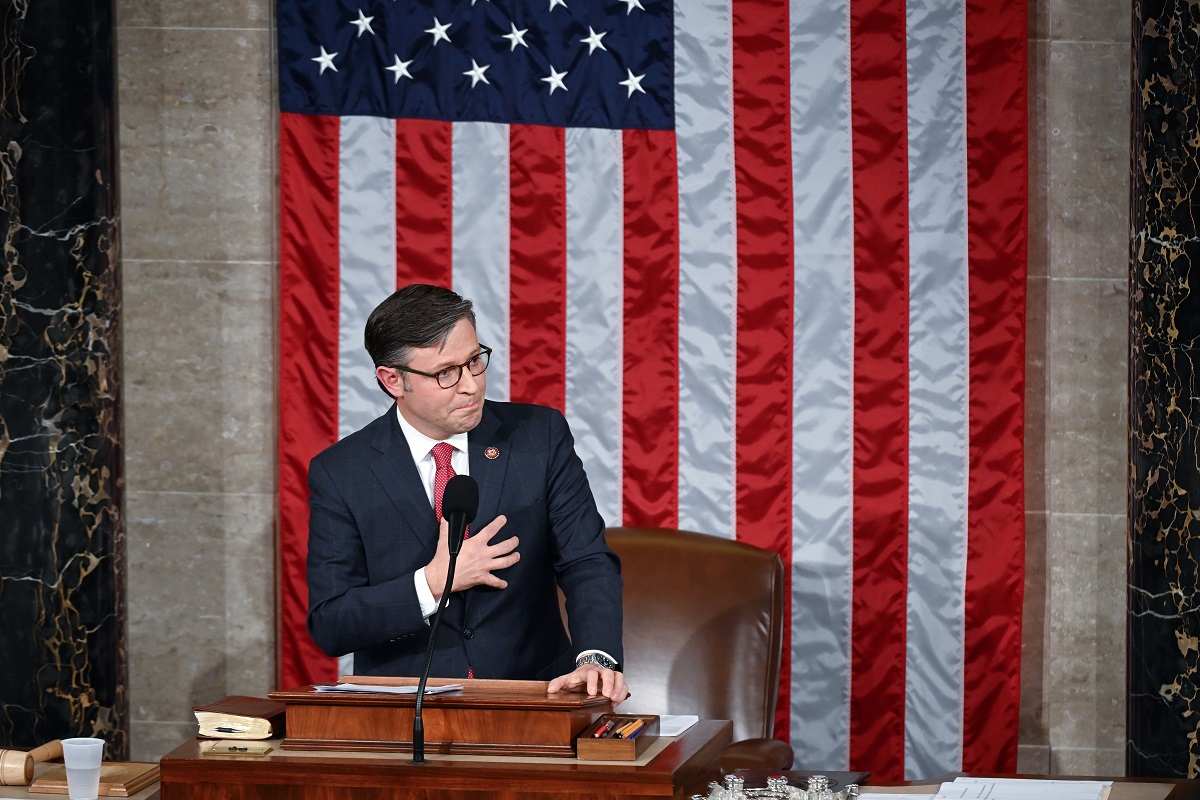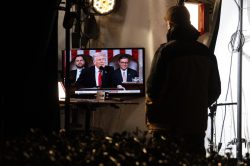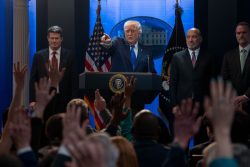
Rep. Mike Johnson (R-La.) addresses fellow House members Wednesday. His election ends a 21-day impasse without a speaker.
12:08 JST, October 26, 2023
In the weeks after the 2020 election, an obscure Republican lawmaker from Louisiana led a congressional effort to overturn the presidential results in four battleground states that had helped secure Joe Biden’s victory over Donald Trump.
The victories were a sham, Mike Johnson argued, because state election officials had changed voting procedures, without first seeking legislative approval, to address the challenges of casting ballots during the coronavirus pandemic.
Johnson recruited 125 House Republicans to join him in signing a U.S. Supreme Court brief saying as much, and on Jan. 6, 2021, an even larger group of lawmakers, including Johnson, voted against certifying the electoral college vote for Biden in two key battlegrounds.
Johnson has never repudiated his part in any of it. On Wednesday, he was elected speaker of the House.
Johnson played one of the most significant roles of any member of Congress in the effort to overturn the election. But unlike some of his more bombastic colleagues, much of it was behind the scenes, through a legal filing, closed-door Republican Party strategy sessions and private conversations with Trump.
Now that Johnson has emerged as the next speaker in a vote that was celebrated Wednesday by Trump’s MAGA movement, his role as a ringleader of efforts to overturn Biden’s victory is generating new scrutiny. It is also prompting fresh attention to how Johnson could use his new job to influence the outcome of the next presidential election, should he still be speaker in January 2025.
Johnson on Wednesday declined to comment when asked whether he believed the 2020 election was stolen. “We’re not talking about any issues today,” he told The Washington Post after emerging with the speaker’s gavel following weeks of dysfunction led by the most fervent Trump loyalists within the House GOP. “My position is very well-known.”
That position as an organizer of efforts to undermine the 2020 vote, in fact, is probably a key reason for his ascension. The caucus had balked the day before at elevating Tom Emmer (Minn.), who was among the minority of House Republicans that voted to certify Biden’s win. Johnson’s bid was also aided by a genial nature that contrasted sharply with pro-Trump firebrand and ally Jim Jordan (R-Ohio), whose quest for speaker sputtered after moderates refused to back him.
But experts said Johnson’s more palatable disposition shouldn’t disguise his willingness to meddle in the outcome of elections.
“Johnson looks a lot like Jim Jordan’s revenge,” said Austin Sarat, a professor of law and political science at Amherst College. “He is someone who is up to his neck in election denialism, and that does not bode well for what is likely to happen in the House.”
Democracy advocates and constitutional scholars are particularly concerned about what he could do in 2024, when Trump may once again be the Republican nominee for president.
“Having somebody who took those steps in such a position of leadership going into yet another presidential election with quite likely the same people on the ballot is actually very troubling,” said Genevieve Nadeau, a lawyer with Protect Democracy, a nonpartisan advocacy group for fair elections.
Johnson’s role in seeking to overturn the 2020 vote was directly solicited by Trump, who tapped the lawmaker – first elected the same year that Trump was, in 2016 – to help spearhead efforts on Capitol Hill in support of a court challenge.
“President Trump called me last night and I was encouraged to hear his continued resolve to ensure that every LEGAL vote gets properly counted and that all instances of fraud and illegality are investigated and prosecuted,” Johnson tweeted on Nov. 9, 2020.
Weeks later, after Texas Attorney General Ken Paxton (R) filed suit seeking to challenge the voting practices in a number of swing states that Biden had won, Johnson was tasked with whipping House support as the case made its way to the Supreme Court.
To do this, Johnson, who had sway as head of the Republican Study Group – a conservative policy group in the House – assiduously allied himself with Trump. He used that connection in writing a Dec. 9, 2020, email with the subject line: “Time-sensitive request from President Trump.”
Johnson wrote that Trump had called him and “asked me to contact all Republican Members of the House and Senate today and request that all join on to our brief.”
The brief said it represented the concerns of members of Congress, “shared by untold millions of their constituents, that the unconstitutional irregularities involved in the 2020 presidential election cast doubt upon its outcome and the integrity of the American system of elections.” Trump had boosted the case, tweeting that it was “very strong.”
Johnson’s role was so central that the brief’s cover page reads: “U.S. Representative Mike Johnson and 125 Other Members of the U.S. House of Representatives.”
The Supreme Court quickly threw out the case, saying on Dec. 11, 2020, that Texas did not have standing. Trump tweeted that the court had “really let us down. No Wisdom, No Courage.”
In the wake of the brief’s failure, some Republicans complained to Johnson that they felt he had unfairly pressured them to sign on to the filing by invoking Trump’s name, according to a former House Republican senior aide who spoke on the condition of anonymity to describe private conversations. Johnson told his colleagues that he was sorry if they felt pressured, according to the aide, who was on the call in which Johnson made the comment.
After the case was tossed out, Johnson was asked by the New Yorker why he thought Trump’s legal team had failed in an array of legal challenges. He stood by the legal claims and asserted that the problem was that Trump didn’t have enough good lawyers.
“It appears that some of the larger law firms that might have been lined up early on, for whatever reason backed out, and Rudy Giuliani was in charge,” Johnson said, referring to the former New York City mayor. “And I don’t think their army of lawyers was large enough.”
Constitutional scholars disagreed, saying that in addition to the lack of standing, the lawsuit was attempting to challenge voting rules after the election had passed rather than in advance, when the procedures had been adopted.
“It was an effort to confer some patina of legitimacy on what was essentially an illegitimate and dangerous move to overthrow an election,” said Rep. Jamie B. Raskin (D-Md.), who was a member of the House’s Jan. 6 committee.
Following the lawsuit’s failure, Johnson began trying to gather support to prevent the certification of the electoral college vote for Biden. On Jan. 5, 2021, one day before Congress was slated to vote on certification, Johnson met with other members of the Republican caucus to discuss how to overturn the election results. Johnson argued that some states had changed their voting rules as a result of the pandemic – which he said was constitutional and validated his effort not to certify Biden’s election, according to a recording of the session reported by the New York Times.
Johnson later told the Times that he “never” believed claims that Trump lost due to massive fraud, but instead said he told colleagues, “Guys, you don’t have to worry about any of that. They violated the Constitution.”
(Johnson did, in fact, share fantastical claims of fraud, including one that Dominion Voting Systems’s election equipment originated under the late Venezuelan dictator Hugo Chávez’s communist regime.)
As Johnson met with Republican colleagues in the House’s Visitor Center auditorium Jan. 5, he laid out his case. While there were a number of members in the meeting who objected to his argument, many of those listening had been among those who signed Johnson’s amicus brief, held him in high regard and applauded his effort, according to a former Republican staffer familiar with the session.
“Johnson was leading the debate, and members used his case to rationalize why they objected to the certification,” the staffer said, speaking on the condition of anonymity to discuss a private session.
In the aftermath of the attack by pro-Trump rioters on the Capitol, Johnson contacted Cassidy Hutchinson, an aide to White House Chief of Staff Mark Meadows, to inquire about whether there was an effort underway to try to remove Trump under the 25th Amendment, according to Hutchinson’s testimony to the Jan. 6 committee.
“Has Mark heard about the 25th Amendment? Does he think it’s going to happen?” Johnson asked, according to Hutchinson. She said she took his query as a “conversational” effort to pick up on what was being said at the White House.
The Jan. 6 committee did not subpoena Johnson about his involvement, although lawyers for the committee did question some witnesses about his actions, according to its records. But one email released by the committee underscored how controversial some of those actions were perceived to be.
The email from then-Rep. Mo Brooks (R-Ala.), saying it was “pursuant to a request from Matt Gaetz” – the Florida Republican who later engineered the ouster of House Speaker Kevin McCarthy (R-Calif.) – recommended that Trump pardon “Every Republican who signed the Amicus brief in the Texas lawsuit,” referring to the filing led by Johnson.
Most experts say the Trump-led pressure campaign following the 2020 election aimed at Vice President Mike Pence would be much harder to execute now because of changes to the Electoral Count Act limiting the ability of Congress to object to results submitted by the states.
But there is still cause for concern, several scholars said. Richard H. Pildes, a New York University law professor, said the speaker would have significant power to shape the rules if neither candidate wins an outright majority of electoral college votes – a possibility if a third-party candidate manages to win one or more states.
In that scenario, a “contingent election” would occur in the House, where each state’s delegation is given one vote.
A more alarming concern is whether Johnson would attempt to disrupt the proceedings in a more dramatic way – for instance, by preventing the session from happening altogether. Although the vice president presides over the occasion, it occurs in the House chamber – the domain of the speaker.
“What if the House refuses to participate?” speculated Edward B. Foley, a law professor and election law expert at Ohio State University, referring to the hypothetical possibility that the House might disregard its statutory obligations under the new Electoral Count Reform Act.
And what if, Foley added, Congress failed to finalize the results by Jan. 20, Inauguration Day? Joe Biden and Kamala D. Harris would no longer be president and vice president. A constitutional crisis over their succession could ensue. Johnson, as speaker, would be next in line.
Foley quickly noted that he believes it’s a far-fetched scenario. But the events of Jan. 6, 2021, would have seemed far-fetched before they actually occurred, too, he said.
Top Articles in News Services
-

Survey Shows False Election Info Perceived as True
-

Hong Kong Ex-Publisher Jimmy Lai’s Sentence Raises International Outcry as China Defends It
-

Japan’s Nikkei Stock Average Touches 58,000 as Yen, Jgbs Rally on Election Fallout (UPDATE 1)
-

Japan’s Nikkei Stock Average Falls as US-Iran Tensions Unsettle Investors (UPDATE 1)
-

Trump Names Former Federal Reserve Governor Warsh as the Next Fed Chair, Replacing Powell
JN ACCESS RANKING
-

Producer Behind Pop Group XG Arrested for Cocaine Possession
-

Japan PM Takaichi’s Cabinet Resigns en Masse
-

Man Infected with Measles Reportedly Dined at Restaurant in Tokyo Station
-

Israeli Ambassador to Japan Speaks about Japan’s Role in the Reconstruction of Gaza
-

Videos Plagiarized, Reposted with False Subtitles Claiming ‘Ryukyu Belongs to China’; Anti-China False Information Also Posted in Japan























